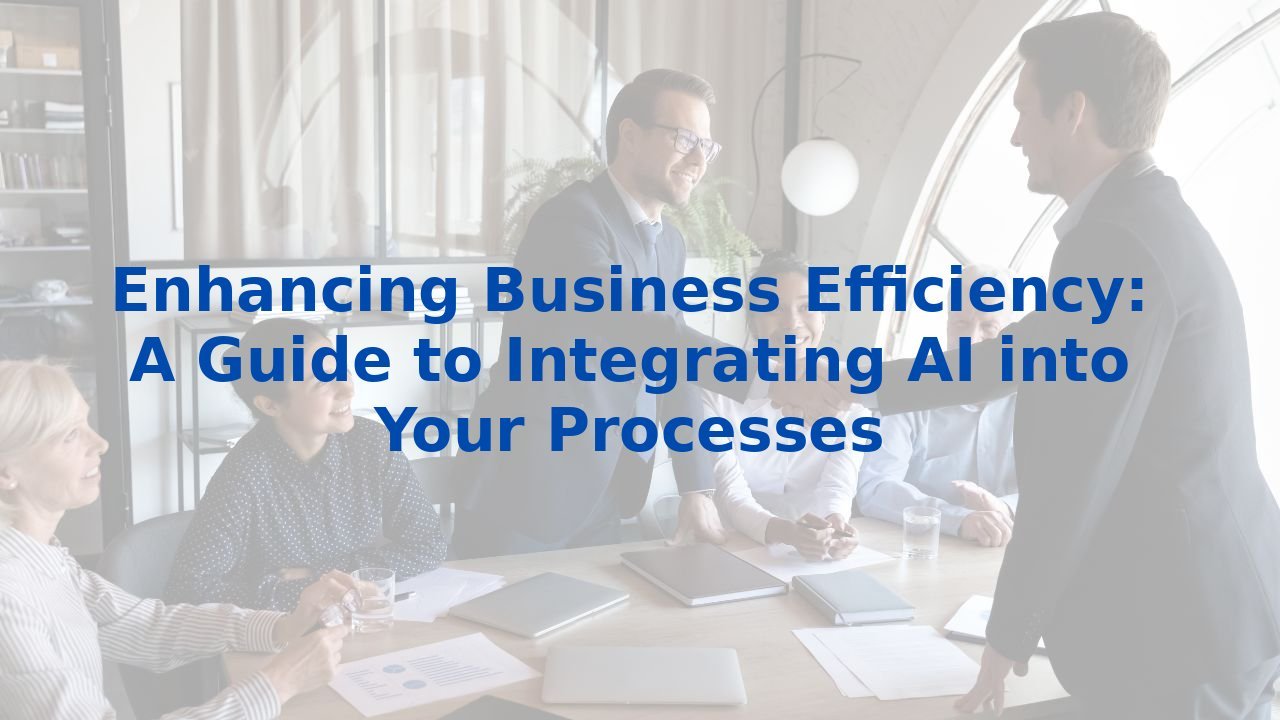Enhancing Business Efficiency: A Guide to Integrating AI into Your Processes
Enhancing Business Efficiency: A Guide to Integrating AI into Your Processes
In the relentless quest for efficiency, organizations are turning to Artificial Intelligence (AI) as a transformative ally. As businesses grapple with complexity and strive for peak performance, integrating AI into business processes has emerged as a pivotal strategy. This guide explores how AI can enhance various business processes and outlines the profound impact of employee training in unlocking AI’s full potential.
What is AI in Business Process Management?
AI in business process management refers to the infusion of intelligent technology into the very fabric of organizational workflows. It encompasses the use of AI to analyze, automate, and optimize processes, thereby streamlining operations, enhancing decision-making, and reducing the manual workload on teams. With AI's ability to process vast amounts of data, organizations can achieve unprecedented levels of efficiency and productivity.
Key Components of AI in BPM
At its core, the application of AI in business process management revolves around three fundamental components:
- Data Analysis: AI excels in sifting through data, equipping teams with insights that inform tactical and strategic decisions. It unveils trends, predicts outcomes, and identifies root causes that may have previously gone unnoticed.
- Process Building: Leveraging AI enables organizations to create new workflows tailored to specific needs. This includes optimizing existing processes and generating structured process maps that enhance operational clarity.
- Automation: AI automates repetitive tasks, liberating teams from mundane work. Tasks such as document processing, lead scoring, and content generation can now be executed with remarkable speed and accuracy.
Benefits of AI in Business Processes
The integration of AI comes with a myriad of advantages that elevate organizational performance and empower employees. Here are some of the standout benefits:
- Process Discovery: By utilizing process mining and natural language processing, AI uncovers existing workflows, spotlighting inefficiencies and bottlenecks that hinder productivity.
- Data-Driven Improvement: With predictive modeling and ongoing feedback, AI facilitates continuous improvement cycles, empowering teams to refine their processes and enhance overall performance.
- Real-Time Monitoring: AI enables real-time oversight of operations, allowing organizations to detect anomalies swiftly and address potential issues before they escalate.
- Enhanced Decision-Making: By digesting data from multiple sources, AI arms decision-makers with insights that lead to informed and effective choices, aligning with business objectives.
Applications of AI Across Business Processes
The versatility of AI lends itself to various business processes, enhancing both core and support operations. Here are specific areas where AI makes a substantial impact:
- Sales and Marketing: Tasks such as lead scoring and personalized engagement are automated, allowing sales teams to focus on building relationships while AI handles the data-heavy lifting.
- Customer Service: AI streamlines customer interactions, automating routine inquiries and gauging service quality through sentiment analysis, ensuring consistent and positive experiences.
- Product Development: Generative design software powered by AI explores all viable designs, significantly reducing development time and resource waste.
- Human Resources: From recruitment to employee development, AI enhances objectivity and streamlines processes, ensuring that HR teams can focus on strategic initiatives rather than administrative tasks.
The Importance of Employee Training
While the advantages of integrating AI are clear, the success of these technologies hinges on employee readiness. Training is essential for several reasons:
- Understanding AI Capabilities: Employees must be educated on AI’s functions to seamlessly integrate these tools into their daily operations.
- Adaptation to New Tools: As organizations leverage AI, it's vital for employees to learn how to utilize these technologies effectively, maximizing their potential.
- Informed Decision-Making: With training, employees can interpret AI-driven insights, enabling them to make well-informed, strategic decisions that drive positive outcomes.
- Continuous Innovation: An ongoing commitment to training fosters a culture of continuous improvement, ensuring teams remain agile in adapting to evolving market conditions.
Ultimately, by equipping your workforce with the skills necessary to leverage AI, you create a foundation for sustained growth and innovation. Training initiatives can help unlock the full spectrum of possibilities that AI brings.
Conclusion
Integrating AI into business processes is not merely a trend—it's a strategic imperative for organizations aiming to thrive in today’s competitive landscape. As AI enhances efficiency, reduces costs, and improves decision-making, it also fosters a culture of continuous improvement through employee training. By understanding the processes that can be transformed through AI and investing in workforce education, businesses are well-positioned to leverage these technologies effectively, ensuring lasting success in their respective industries.
To explore more about effective AI training solutions for your organization, visit Complete AI Training.



